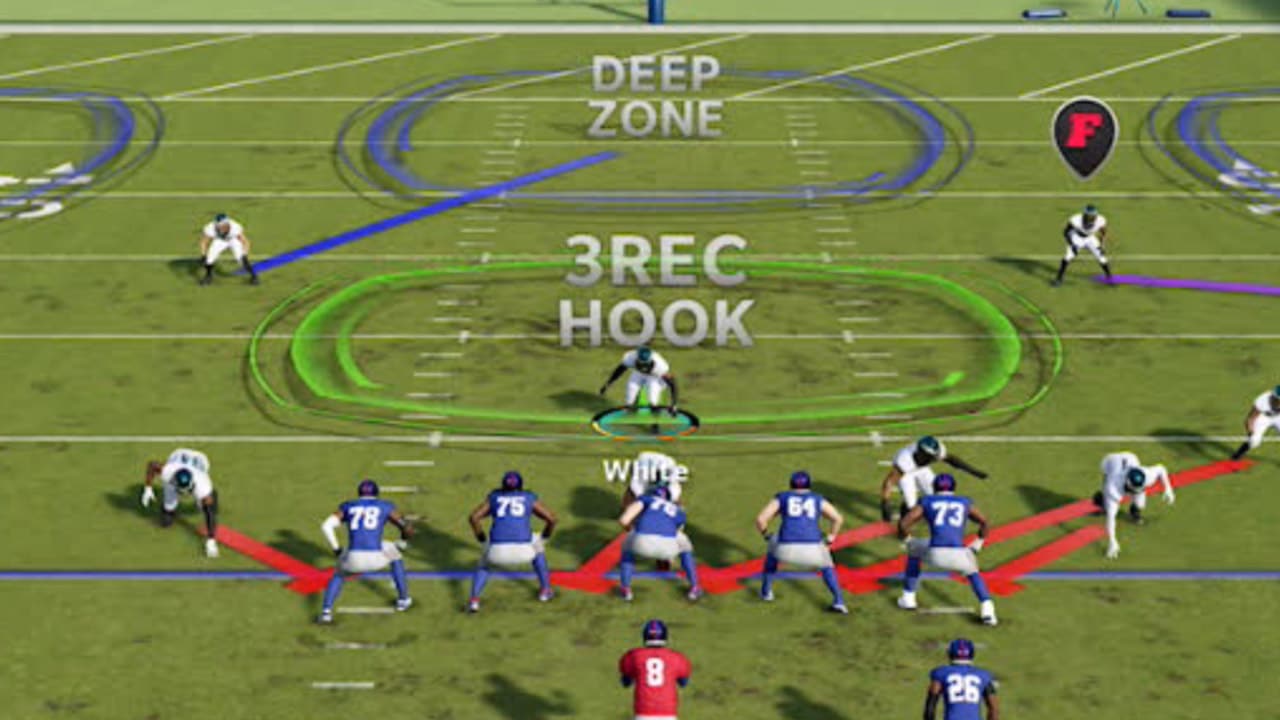In this Madden Guides blog, we examine the various Madden Zone Coverage Assignments found in the game, plus breakdown the pros and cons of each.
In the NFL, zone coverage is essential for pass coverage, and in Madden players have a variety of choices for stopping opposing offenses. With so many choices, it’s difficult to understand what each one does or how to use each play effectively. To help you spend more time adjusting and winning games, we’ve broken down each game zone in this post.
Zone Coverage Assignments:
EA Sports spoke with NFL coaches and players to gain an understanding of coverage concepts, guidelines, and strategies.. As a result, several zone coverage assignments were produced, which can construct different coverage concepts in the game.
Rules and reasoning are established for each zone coverage assignment with the understanding that they will apply to particular coverages. Everyone taking part in a coverage concept is aware of the overall plan and how their specific role fits into it. Players can use “Pattern Reading/Pattern Matching” if they understand the scheme. This is a high-level summary of zone coverage responsibilities before we dive into the specifics of Progression Reads for the zone defenders. Also, the first down sticks can be protected to aid underneath zone defenders. Using Protect the Sticks on third down is an excellent option.
Below are the zone assignments with a summary of their purpose and how they work.
3 Receiver Hook:
In Cover 4 defenses and 3 Deep 3 Under zone blitzes, the inside zone defender is largely responsible for zone assignment. The inside short and intermediate parts of the field are to be guarded by the 3 Receiver Hook player. He makes his first throw toward the offensive formation’s third receiver.
Cloud Flat:
A cloud flat is a type of zone coverage in Madden that can defend both deep and short outside areas of the field. It is a common and versatile zone that can cover out routes, curl routes, and some corner routes. A cloud flat is suitable for medium yardage situations, such as on first and ten. It allows the opponent to complete quick passes to the flats, but limits their yards after the catch.
Curl Flat:
In Cover 3-style defenses, the outside edge players are primarily responsible for zone assignment. The Curl Flat player must protect the outside intermediate and short portions of Cover 3. His top objective is to defend against the longer outside routes before mobilizing for the shorter ones. The defenders in this zone cover any receivers or running backs that enter their area, as well as reacting to any short passes or runs.
Hard Flat:
Hard Flat is a defensive strategy that involves assigning the outside cornerbacks to cover the short outside areas of the field. This zone is typically used in Cover 2 defenses, where two safeties are responsible for the deep halves of the field. The Hard Flat player’s priority is to prevent short passes to the flats, such as swing routes, table routes, or smoke screens. However, this zone can also leave the defense vulnerable to deeper routes, such as corner routes, out routes, or curl routes.
Hook Curl:
In Cover 3 defenses, the two inside zone defenders are primarily responsible for zone assignment. The inside short and intermediate regions of the field must be kept safe by the Hook Curl players. A Hook Curl player may also be in charge of the short outside section of the field to his side in some coverages based on the route concept (Flat).
Middle Read:
In Cover 2 defenses, the middle linebacker is typically responsible for zone assignment. The Middle-Read player must guard the deep center zone of the Cover 2 defense. He evaluates the offensive formation’s passing strength at the start of the play to see whether any receivers are posing a danger to the deep center of the field. Go to your Levels passing notion to counter the middle-read defender. The underneath option will become available as the deep receiver forces the middle-read defense out of position.
Seam Flat:
In Cover 3 type defenses and 3 Deep 3 Under zone blitzes, the outer edge players are primarily responsible for zone assignment. The Seam Flat player can “match” certain inside receiver routes and switch to man coverage when facing vertical routes.
Soft Squat:
Madden Soft Squat Coverage is a type of zone defense can adapt to different route combinations by the offense. It can also bait the quarterback into throwing interceptions by jumping on out-breaking routes. This coverage is effective in long yardage situations, but it can give up short passes in the flats. Based on the offense’s route plan, the Soft Squat player can switch to man coverage. Defensive plays where a Soft Squat player is present are sometimes referred to as “Trap” coverages.
Quarter Flat:
In Cover 4 defenses, the outer edge players are primarily responsible for zone assignment. The Quarter Flat player can “match” specific outside routes run by an inside receiver and “carry” inside receivers’ vertical routes up to a set depth according to the offensive’s route concept. Quarter Flat zone coverage is effective against short and intermediate passes. On the other hand they can be vulnerable to deep routes or inside runs.
Vertical Hook:
In Cover 2 defenses and 2 Deep 4 Under zone blitzes, the two outside edge players are primarily responsible for zone assignment. The Vertical Hook zones can adjust to man coverage depending on the coverage and route concept.
Final Thoughts:
In conclusion, zone coverage assignments in Madden determine how defenders cover specific areas of the field. There are various types, such as cloud flats, hard flats, and deep thirds. Each assignment has global knowledge of the scheme and can make progression reads based on receiver routes. Zone coverage assignments can create various coverage concepts, such as Cover 2, Cover 3, and Cover 4.
For the newest Madden Tips, Strategies, Playbooks, and more, visit the Madden Guides YouTube channel.
